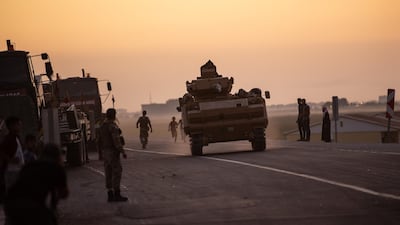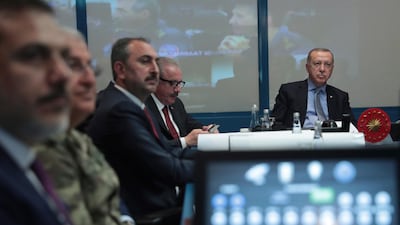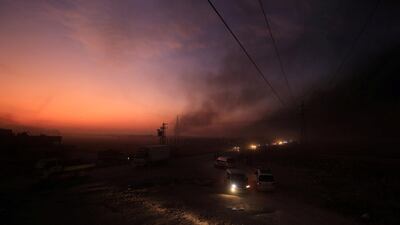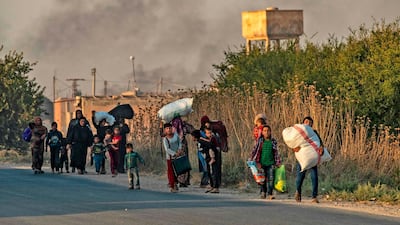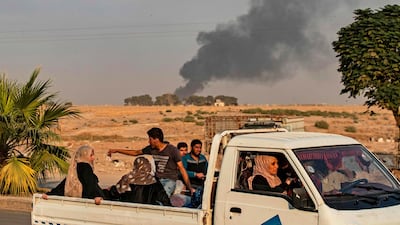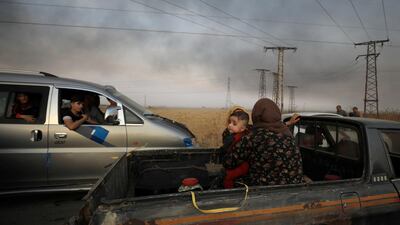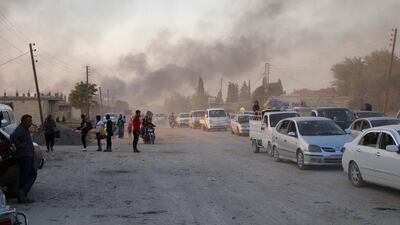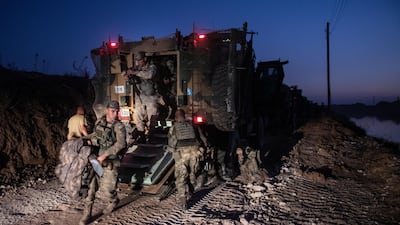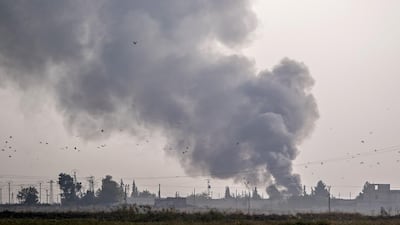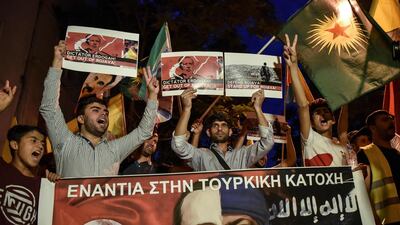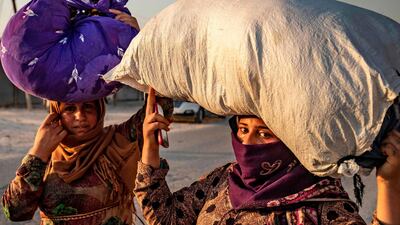Turkey pressed its assault against US-allied Kurdish forces in northern Syria on Thursday for a second day, pounding the region with air strikes and artillery and forcing at least 60,000 panicked civilians to try to flee.
The mass movement has sparked new fears of a humanitarian crisis with an estimated 700,000 people in the areas on which Turkey has set its sights.
At least 23 Syrian Democratic Forces fighters have been killed, along with six fighters from a Turkish-backed Syrian rebel group, the Syrian Observatory for Human Rights said.
The Kurdish-led SDF said Turkish air strikes and shelling also killed nine civilians. Turkish President Recep Tayyip Erdogan said more than 100 militants had been killed.
US President Donald Trump tried to justify the free pass he gave to Mr Erdogan by standing down his troops. Mr Trump's decision is regarded as a betrayal of Washington's Kurdish allies in the war against ISIS.
After launching the assault with air strikes and artillery, the Turkish military and its Syrian proxies crossed the border into Kurdish-controlled areas.
A US representative for the political arm of the SDF on Thursday repeated a call for a no-fly zone in the area and urged the international community to help stop the attack.
The broad offensive, which Mr Erdogan named Operation Peace Spring, drew international outrage and warnings, including from within Mr Trump's Republican Party, and was discussed in an emergency meeting of the UN Security Council on Thursday.
"We ask a for no-fly zone over our area. At least we will not have civilian casualties then," said Sinam Mohamad, the US co-chairman of the Syrian Democratic Council, the political arm of the SDF.
The UAE Minister of State for Foreign Affairs, Dr Anwar Gargash, has joined almost unanimous condemnation from across the Arab world against Turkey's offensive, which was launched on Wednesday evening.
“The broad Arab condemnation of the Turkish aggression against Syria is not surprising,” Dr Gargash tweeted.
“The international position rejecting the Turkish aggression stems from the foundations of international law and a common realisation that this step will complicate the already complicated scene.”
French President Emmanuel Macron urged Turkey to immediately end its offensive, saying it could allow an ISIS resurgence in the area.
"I condemn vehemently the unilateral military offensive in Syria and I urge Turkey to put an end to it as quickly as possible," Mr Macron said in Lyon.
"Turkey is today forgetting that the priority of the international community in Syria is the fight against Daesh and terrorism.
"It is creating a humanitarian risk for millions of people."
Jurgen Schulz, Germany's deputy permanent representative to the UN, said Turkey should end its offensive because it was jeopardising international security.
"We fear that this operation runs the risk of further destabilising the entire region and also re-strengthening ISIS," Mr Schulz said in New York.
"Syria has been severely impacted by this terrible war for eight years and we are now on the verge of starting a political process with the constitutional committee.
"However, the Turkish operation now threatens to unleash another humanitarian catastrophe as well as new refugee movements. We therefore call on Turkey to cease its operation and to pursue its security interests in a peaceful manner."
He said German Foreign Minister Heiko Maas had also made the demand in a call to Turkish Foreign Minister, Mevlut Cavusoglu.
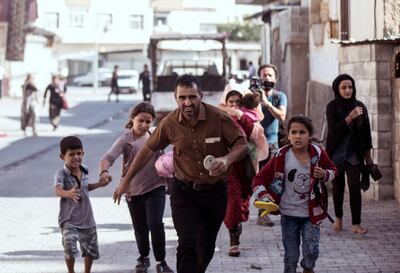
Mark Lowcock, the UN's humanitarian aid co-ordinator, is in Ankara on a two-day trip planned before Turkey began its offensive. He was there to discuss aid operations from Turkey into Syria.
But a spokesman for UN Secretary General Antonio Guterres said Mr Lowcock was "very concerned about the impact of military operations".
He will visit the border town of Gaziantep on Friday.
"We have humanitarian personnel where we believe people may be fleeing for safety," UN spokesman Farhan Haq said.
Mr Haq said staff were not directly in the line of fire of Turkish military operations.
Norway, a Nato ally of Turkey, announced on Thursday that it was suspending all new weapons exports to the country after Ankara launched the operation.
"Given that the situation is complex and changing quickly, the Foreign Ministry as a precautionary measure will not handle any new demands for exports of defence material or material for multiple uses to Turkey," Norwegian Foreign Minister Ine Eriksen Soreide said.
Ms Soreide said the ministry would also review all licences for weapons export that had already been issued.
Finland, which is not a member of the Nato alliance, also announced on Wednesday that it would suspend new arms exports to Turkey, or any other country involved in the fighting.
Turkey also faces repercussions from the country that allowed it to begin its operation, the US.
It could face sanctions under proposals put forward by Republican Senator Lindsey Graham and a Democrat colleague, which would target President Erdogan and top officials.
Mr Cavusoglu warned on Thursday that Turkey would retaliate if the US imposed any sanctions over its military incursion.
Mr Trump had threatened to "obliterate" the Turkish economy if the country went too far in its assault, but it remains unclear how he will react to the latest moves by Ankara.
